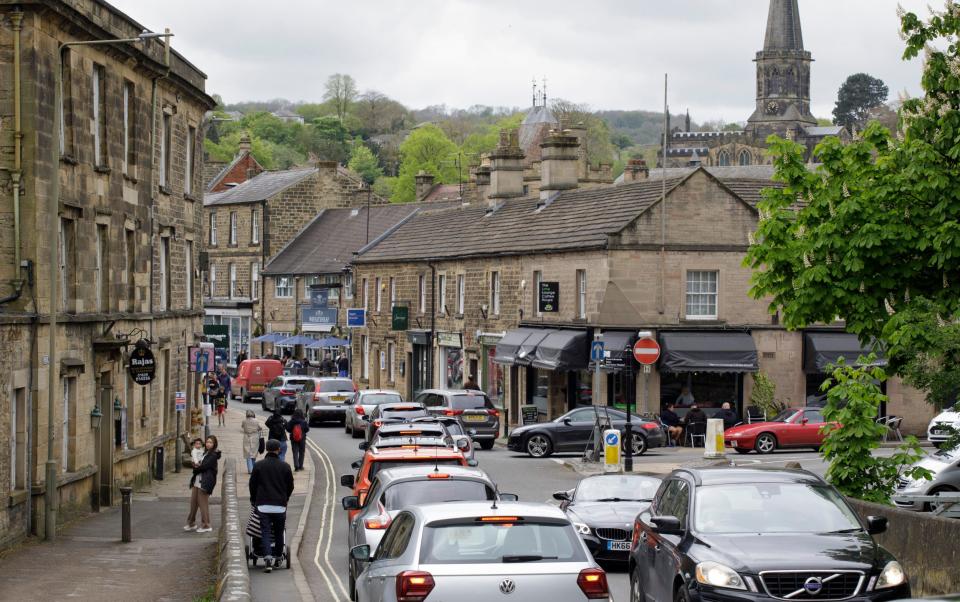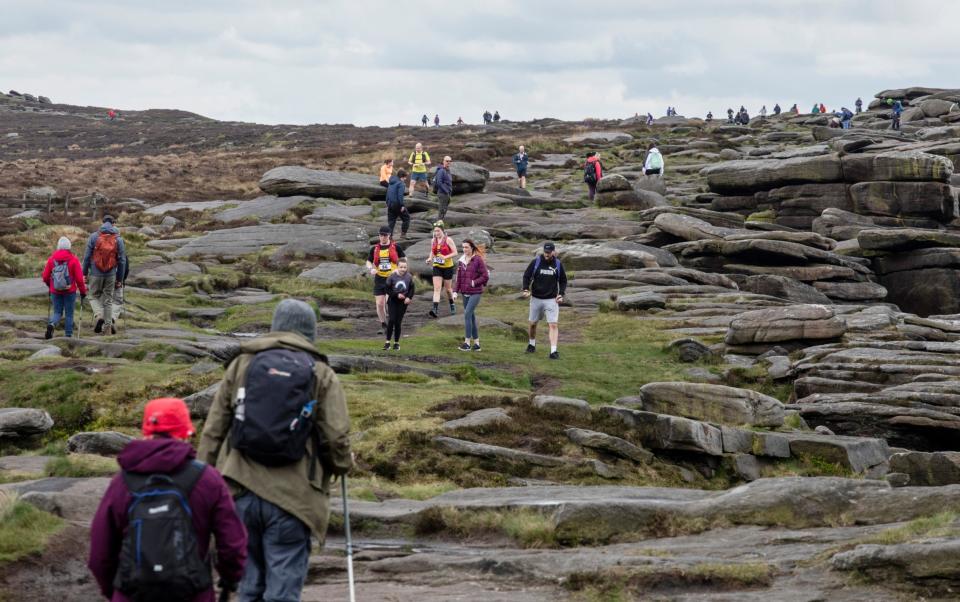What’s worse: a large, gray, asphalt parking lot, or vehicles lining every road as far as the eye can see? It’s the question I asked myself as I stood on the hill of Winnats Head, overlooking the honeypot village of Castleton. It’s a beautiful view, albeit plagued by car-lined roads. A parking space can make a difference, but it would also be a blemish on the landscape.
The night before my trip to the Peak District I had spent at Mosborough Hall, a pleasant little hotel just south of Sheffield, the majority of whose guests are heading to the Peak District “for a stay focused on the area’s natural beauty . ”, explains Managing Director Richard Beck. “In recent years we have seen a lot of younger guests. Hikers, climbers and cyclists, for example.” The parking lot was packed by the time I checked in.
From there it was on to Bakewell, the Peak District’s best-known honeypot town, famous for its medieval bridge, sweet treats and close proximity to Chatsworth House, which featured prominently in the 2005 adaptation of Pride and prejudice. After a little struggle to get into the main parking lot, I found the pretty town filled to the brim. On Water Street, home to a variety of cafes and gift shops, hordes of visitors crowded the street, with huge lines pouring out of every shop.
“It’s busy, but that’s not unusual on a public holiday, it always is,” my waitress shrugged as I tucked into the city’s justly acclaimed specialty at The Old Original Bakewell Pudding Shop. “It keeps us in business. Anyone who wants to reduce the number of tourists will be out of work by the end of the month, even if they don’t want to admit it.”
However, the picture is not so clear for residents. Tourism in Bakewell is a ‘double-edged sword’, says Judith Crosse, who lives locally and regularly visits Bakewell. She admits she is ambivalent about how visitors impact the area. “The local economy is so dependent on visitors, but I bought three books in the shop on Saturday and was the best customer of the day. Tourism can be so fickle. Bakewell in particular is ‘suffering’ as it is accessible from Manchester, Sheffield, Nottingham and Derby, as well as having the major draw of Chatsworth House on its doorstep.”

The bigger problem, Crosse thinks, is cars. “Generally speaking, people who live in the Peak District think twice about going out on public holidays because of the traffic,” she says. “I’ve turned around and gone home because of traffic more times than I can count. Even the secret rat runs that the locals know about are getting clogged.”
I’m warned to avoid Ashbourne, a village in the south, at all costs, and Crosse says I’m lucky there are no major events in Chatsworth this weekend as they would make life hell for drivers.
Things reached a low point for the Peak District over the Easter weekend when a cyclist posted a video of the A6 coming to a standstill. A trip to Matlock? More of a journey to a stalemate. Predictably, the viral video sparked a broader conversation about how the “tourism industry has ruined every national park in the country,” according to one Facebook commenter.
After visiting a few national parks in recent months in search of stories of overtourism, I find that idea rather exaggerated. To my eyes the Peak District seemed remarkably civilised. Piles of rubbish at Dovedale, packets of crisps lying around the Kinder Scout mountaintop, and used nappies littering the paths around Ladybower Reservoir could make for clickable stories, but I found nothing of the sort.
Yes, there were plenty of people exploring on the warm and pleasant Saturday afternoon. Yes, I found trails to be busy at times. But why not? Everyone I saw was safely and respectfully enjoying the scenery. I was impressed by the many guidelines on how to do this in the park, and there was no shortage of waste bins. Only someone who is really in the mud can blame his fellow man for going out to enjoy the outdoors.
The only problem I faced in the beautiful Peak District was the cars.
Research from car brand Dacia and parking website JustPark found that 21 million Brits – just over 40 percent of drivers – were planning a road trip over the bank holiday weekend, with one in 10 saying it was likely to be their only major road trip in recent years would be. year. It is not without reason that national parks such as the Peak District experience problems around the holidays. Tellingly, 69 percent of respondents cited the inability to find parking as one of their biggest concerns when making the trip.
In the Peak District they had been right to be concerned. Everywhere I drove there were vehicles lining the streets, on grassy shoulders along roads decorated with vehicles. It made driving through the park awkward and sometimes dangerous (the one bus I saw during my adventure swerved wildly around a sharp bend to avoid parked cars on the side of the road.)
“Make sure you write about the car parks,” groaned Sam, a student climber I met at Stanage Edge, a popular bouldering spot, when I told him I was with them. The Telegraph. “When we came here a few years ago the parking was free, but now they charge so you end up with cars parked all over the road.”


Parking policies throughout the national park are “inconsistent,” I was told. Some car parks require cash payment, while others require app payments (patchy phone signals in rural areas can make this tricky at the best of times.) “The park could certainly do more to advertise where car parks are, their capacity and how to book in advance pay. suggests Allie, Sam’s partner.
Could parking be better? Possibly. Yet herein lies the Gordian knot that every national park must untangle: people come here to find a pristine natural landscape, but it is their presence that spoils it. Which brings us back to that question: roads lined with cars or more parking? Is there a lesser of two evils?
A simplistic analysis would suggest that there are no more cars at all, but given that 13.25 million people (and counting) visit the Peak District every year, and according to the National Park Authority’s own statistics, 85 percent of them with the travels by car, that is a fantasy.
The park is already served by five different rail lines and dozens of buses per hour; you could hardly argue that it lacks public transport links, especially compared to those of the Lake District or the Yorkshire Dales, which are much less well served by rail. The truth is that driving is simply more convenient for most.
It is also not the case that the national park necessarily takes on its responsibilities here. Following a regional symposium with private and public sector stakeholders, it has hired a Sustainable Travel Officer, whose job is to advise the five local authorities whose public transport services the park serves to match visitors’ needs with the services offered . The role also includes a commitment to promoting sustainable travel.
“We recognize that many visitors still choose to travel to the Peak District by car. That’s why our own parking network continues to offer very competitive rates, allowing people to park safely and away from the road,” said a Peak District National Park. A spokesperson for the authority told the newspaper Telegraph. “We continue to work closely with local transport authorities and private operators to understand the wider picture of travel to and within the Peak District, so that policies and services can meet expectations and ease pressure in the most affected areas.”
What should be done then? The answers are the same obvious suggestions that every national park has made in recent years: we should all use public transportation, we should educate ourselves about the less-visited areas, and we should plan our parking more carefully. And if you do encounter a stalemate, try not to get angry; after all, you are part of the problem.
Jack Rear was a guest at Mosborough Hall Hotel, which offers double rooms from £89.95 per night. A rental car was arranged by Dacia.